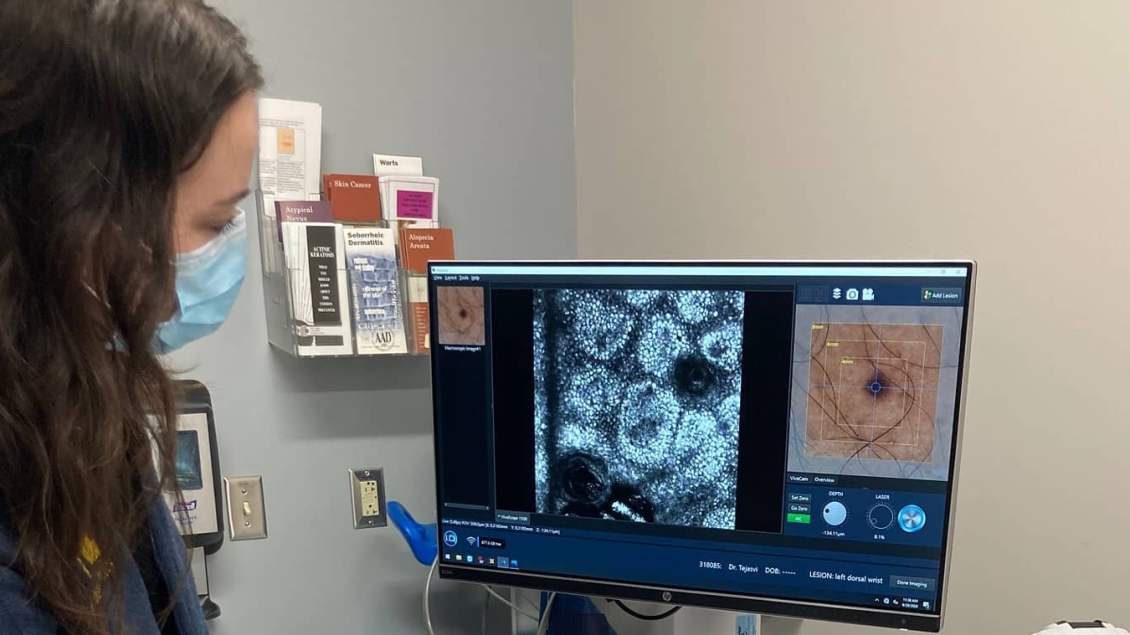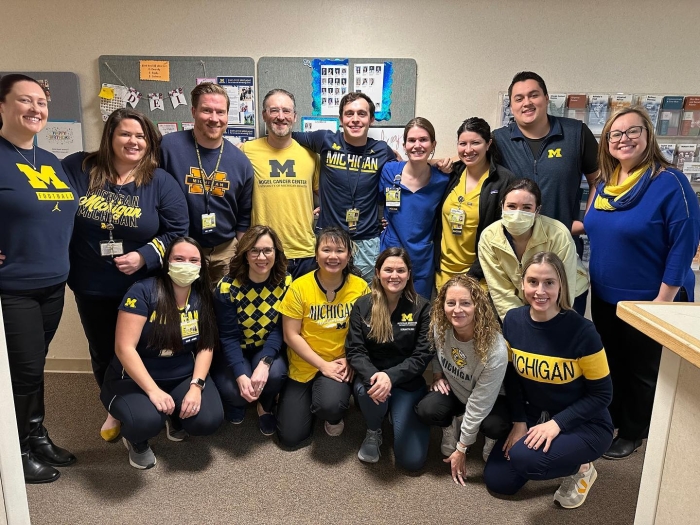
The University of Michigan Medical School Department of Dermatology Residency Program didactic curriculum is an academically rigorous and comprehensive program consisting of medical and complex dermatology, cutaneous surgery and oncology, cosmetics, pediatrics and dermatopathology—all with a strong focus on skin of color and diversity, equity and inclusion.
Residents have eight hours of protected didactic time each week—from 8:00am-12:00pm every Tuesday and Thursday morning. Every week, residents, faculty and medical students attend sessions to solidify core knowledge of dermatology, and to learn using interactive teaching methods.
Dr. Frank Wang is the faculty lead for the curriculum and carefully plans out the annual didactic calendar in order to ensure that residents are well-prepared for the practice of dermatology and board exams, and that our curriculum meets ACGME standards and expectations. The majority of our didactic sessions are faculty-led and faculty-directed.
- Diagnostic Conference with live patient presentations
- Dermatopathology reading and unknown slide review
- Bookclub — Assigned textbook reading—Bolognia’s Dermatology
- Clinical image review (AKA Kodachromes)
- Textbook reading, clinical image review, and dermatopathology unknown sessions all cover the same topics each week.
- Clinicopathologic correlation conference (CPC) — The senior resident who has most recently completed the inpatient consult rotation presents interesting cases from the consult service. For some months, several senior residents will present interesting cases from the clinic. Dermatopathology faculty discuss histopathology findings from each case
- Clinical Science Journal Club (CSJC) — Dr. John Voorhees selects landmark and avant-garde papers from dermatology and from all of medicine to review.
- Therapeutics lecture series — Dr. Frank Wang reviews pharmacologic therapeutics, ensuring that residents are comfortable prescribing all topical and systemic therapies utilized in dermatology.
The department also invites special lecturers and hosts symposia from faculty experts within the department, and in related fields at U-M, including but not limited to: gynecology, ophthalmology, otolaryngology, pediatrics, plastic surgery, psychiatry, rheumatology, surgery, and urology.
Lecture series/themes that occur once every several months throughout the year
- Acne and Rosacea Symposia
- Basic Science
- Board Preparation
- Coding and Practice Management
- Complex Medical Dermatology and Systemic Disease
- Contact Dermatitis
- Cosmetic Dermatology
- Cutaneous Surgery (includes several hands-on workshops)
- Cutaneous T-Cell Lymphoma
- Dermatopathology
- Dermoscopy
- Disparities in Dermatology
- Genodermatoses
- Immunology/Rheumatology
- LGBTQ Curriculum
- Nail Disorders
- Pediatric, Neonatal, and Pregnancy Related Conditions
- Phototherapy
- Quality Improvement and Patient Safety
- Skin Basics and Common Conditions—introduction for first years
- Skin of Color
- Social Determinants of Health
Last but not least, there are special annual events such as the annual (since 2001) Martin Luther King Jr. lecture (focusing on disparities and skin of color dermatology), the Michigan Dermatological Society Annual Meeting, the Charles N. Ellis, M.D., Lectureship for Resident Education in Clinical Dermatology, the Jeffrey and Susan Callen Lectureship in Cutaneous Medicine, and the departmental Skin Biology and Diseases Resource-based Center P30 Basic Science Symposium.
Program Director, Dr. Yolanda Helfrich, and Assistant Program Director, Dr. Frank Wang discuss frequently asked questions about the didactic curriculum for the Department of Dermatology Residency Program.
My experience as a resident at the University of Michigan Department of Dermatology helped to mold me into the dermatologist I am today. The breadth of clinical exposures and volume trained me in efficiency and ensured that I was comfortable with a wide array of both complex and routine dermatologic conditions, instilling a strong medical and surgical foundation.


Follow Michigan Dermatology Residency on Instagram for the latest stories, photos and more.
We acknowledge our role as advocates for meaningful social change towards a just and equitable healthcare system. Our commitment to DEI is at the foundation of our efforts to advance dermatology through the highest standard of patient care, education and research.